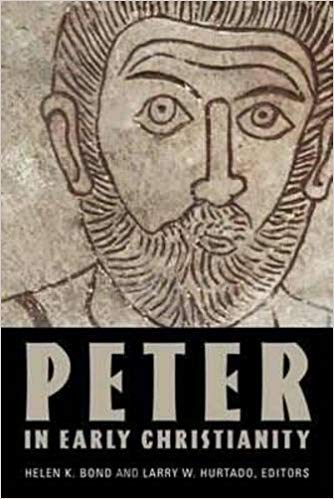Sean Adams (pp. 130-45) tackles the issue of Peter’s literacy, which of course is raised by both Papias (when it comes to Greek) and perhaps in Acts as well, but more on that in a minute. In regard to his own agenda, Adams states at the outset “the perception of Peter as a literate figure helped shape the constructed portraits of Peter in subsequent literature” (p. 130), by which he means post NT literature presumably. Adams begins his discussion with Acts 4.13 where Peter and John are called ἀγράμματοί καὶ ἰδιῶται with the first of these words being the most crucial. One of the things that surprises me in Adams treatment is that he doesn’t really take into consideration the issue of ‘point of view’, by which I mean these words come from the mouths of the Jewish authorities who: 1) hardly know these two men, and 2) certainly don’t know what schooling they have or have not had in Galilee. Even if the evaluation is taken to mean they are illiterate, this simply tells us the authorities perceptions of the men, who seemed ordinary. What they could say with more certainty is that they were not trained in some school or synagogue in Jerusalem, but that hardly makes them illiterate. The word ‘agrammatos’ literally means without letters, and yes it could mean illiterate (cf. Xenephon Memorab. 4.2.20; Plutarch, Reg. imp. 186A). However as the new Brill Dictionary of Ancient Greek shows, there is precedent from the writings of Philo of Byzantium in the second century B.C. for the meaning ‘uneducated’ or even unable to write correctly. This is hardly a surprise since a grammateus is a scribe— one who writes professionally and presumably does so well. As for ‘idiotai’ it does not mean idiots! It has a range of meaning varying from ordinary, to uninstructed or uneducated, to rough. And in any case, this is the evaluation of Jewish authorities who hardly know these men and are surprised by their eloquence or knowledge of Scripture or both. But Luke’s point is that the Holy Spirit gives them their words. They are surprised that persons without formal training could speak in this manner. Origen says they had not obtained even the rudiments of learning. Chrysostom Hom. Act 10) is more helpful clearly distinguishing the two Greek words with the former meaning unlearned, and the latter meaning a common person. He reminds that a common person could be learned.
Adams goes on to critique the theory that 1 Peter could be by the historical Peter, proffering the usual arguments about the excellent Greek not likely coming from a Galilean fisherman. But like others such as John Elliot, Adams has misread what 1 Peter 5.12 likely is telling us. Firstly, the word briefly makes this statement about the writing of the document not its delivery by Silas! He didn’t deliver it briefly. Secondly, it is perfectly correct to take the phrase ‘I wrote to you through Silas to mean Silas was the scribe for the document, and to him can be credited the good Greek. But the voice and ideas in the letter are likely Peter’s. We will deal with this in more detail when we interact with Gene Green’s Vox Petri later in the month. Adams is correct however that 1 Pet. 5.12 is sufficient in itself to have led to later Christian reflection on Peter as being literate to some degree at least, which begins actually with 2 Peter 3.1 when it says Peter had previously written to them. Acts of Peter 20 refers directly to Peter’s ability to read and write as does the even later apocryphal letters of Peter to James. Clementine Recognitions 1.62 clearly refers to Acts 4.13, and the conclusion is Peter is denying any ‘long learning’ but rather relying on supernaturally given knowledge.
Adam concludes that the long tradition of reflecting on Peter by Christians shows he is consistently being portrayed as a person of authority who can interpret Biblical texts and on occasion can read and write them as well. Adams concludes that because of the church’s acceptance of 1 Peter as being by Peter himself, they then took 1 Pet. 5.12 to indicate he was literate, which spawned the later apocryphal reflections on the matter.













